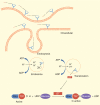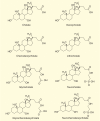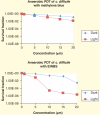Clostridium difficile infection: molecular pathogenesis and novel therapeutics
- PMID: 24410618
- PMCID: PMC4306399
- DOI: 10.1586/14787210.2014.866515
Clostridium difficile infection: molecular pathogenesis and novel therapeutics
Abstract
The Gram-positive anaerobic bacterium Clostridium difficile produces toxins A and B, which can cause a spectrum of diseases from pseudomembranous colitis to C. difficile-associated diarrhea. A limited number of C. difficile strains also produce a binary toxin that exhibits ADP ribosyltransferase activity. Here, the structure and the mechanism of action of these toxins as well as their role in disease are reviewed. Nosocomial C. difficile infection is often contracted in hospital when patients treated with antibiotics suffer a disturbance in normal gut microflora. C. difficile spores can persist on dry, inanimate surface for months. Metronidazole and oral vancomycin are clinically used for treatment of C. difficile infection but clinical failure and concern about promotion of resistance are motivating the search for novel non-antibiotic therapeutics. Methods for controlling both toxins and spores, replacing gut microflora by probiotics or fecal transplant, and killing bacteria in the anaerobic gut by photodynamic therapy are discussed.
Figures










Similar articles
-
Clostridium difficile and inflammatory bowel disease: role in pathogenesis and implications in treatment.World J Gastroenterol. 2013 Nov 21;19(43):7577-85. doi: 10.3748/wjg.v19.i43.7577. World J Gastroenterol. 2013. PMID: 24282348 Free PMC article. Review.
-
In vitro and in vivo antibacterial evaluation of cadazolid, a new antibiotic for treatment of Clostridium difficile infections.Antimicrob Agents Chemother. 2014;58(2):892-900. doi: 10.1128/AAC.01830-13. Epub 2013 Nov 25. Antimicrob Agents Chemother. 2014. PMID: 24277020 Free PMC article.
-
The role of toxins in Clostridium difficile infection.FEMS Microbiol Rev. 2017 Nov 1;41(6):723-750. doi: 10.1093/femsre/fux048. FEMS Microbiol Rev. 2017. PMID: 29048477 Free PMC article. Review.
-
Bile salt inhibition of host cell damage by Clostridium difficile toxins.PLoS One. 2013 Nov 11;8(11):e79631. doi: 10.1371/journal.pone.0079631. eCollection 2013. PLoS One. 2013. PMID: 24244530 Free PMC article.
-
Sensitivity to antibiotics of Clostridium difficile toxigenic nosocomial strains.Folia Microbiol (Praha). 2014 May;59(3):209-15. doi: 10.1007/s12223-013-0283-1. Epub 2013 Oct 11. Folia Microbiol (Praha). 2014. PMID: 24114414
Cited by
-
High frequency of toxigenic Clostridium difficile and Clostridium perfringens coinfection among diarrheic patients at health care facility-onset (HCFO) and community-onset (CO) centers in Bogotá, Colombia.Gut Pathog. 2019 Jun 3;11:27. doi: 10.1186/s13099-019-0308-7. eCollection 2019. Gut Pathog. 2019. PMID: 31171939 Free PMC article.
-
The use of surveillance and preventative measures for methicillin-resistant staphylococcus aureus infections in surgical patients.Antimicrob Resist Infect Control. 2014 May 14;3:18. doi: 10.1186/2047-2994-3-18. eCollection 2014. Antimicrob Resist Infect Control. 2014. PMID: 24847437 Free PMC article. Review.
-
Complete genome sequence of the Clostridium difficile LCL126.Bioengineered. 2021 Dec;12(1):745-754. doi: 10.1080/21655979.2021.1894798. Bioengineered. 2021. PMID: 33896381 Free PMC article.
-
A simplified protocol for high-yield expression and purification of bacterial topoisomerase I.Protein Expr Purif. 2016 Aug;124:32-40. doi: 10.1016/j.pep.2016.04.010. Epub 2016 Apr 23. Protein Expr Purif. 2016. PMID: 27117979 Free PMC article.
-
The Intestinal Microbiota May Be a Potential Theranostic Tool for Personalized Medicine.J Pers Med. 2022 Mar 24;12(4):523. doi: 10.3390/jpm12040523. J Pers Med. 2022. PMID: 35455639 Free PMC article. Review.
References
-
- Bartlett JG. Narrative review: the new epidemic of Clostridium difficile-associated enteric disease. Ann. Intern. Med. 2006;145:758–764. - PubMed
-
- Brazier JS. Clostridium difficile: from obscurity to superbug. Br. J. Biomed. Sci. 2008;65:39–44. - PubMed
-
- Ozaki E, Kato H, Kita H, et al. Clostridium difficile colonization in healthy adults: transient colonization and correlation with enterococcal colonization. J. Med. Microbiol. 2004;53:167–172. - PubMed
-
- Hurley BW, Nguyen CC. The spectrum of pseudomembranous enterocolitis and antibiotic-associated diarrhea. Arch. Intern. Med. 2002;162:2177–2184. [Covers the types of disease associated with Clostridium difficile infection (CDI).] - PubMed
-
- Bartlett JG. Antibiotic-associated diarrhea. Clin. Infect. Dis. 1992;15:573–581. - PubMed
Publication types
MeSH terms
Grants and funding
LinkOut - more resources
Full Text Sources
Other Literature Sources
Medical
Molecular Biology Databases
